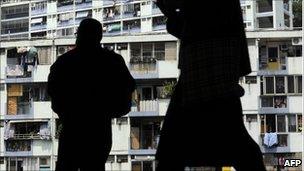Hong Kong workers to enjoy minimum wage for first time
- Published

Hong Kong has introduced a minimum wage that is expected to benefit 270,000 low-paid workers, or around 10% of the working population.
Workers will now earn a minimum of HK$28 ($3.60; £2.18) per hour.
The legislation was passed in response to public pressure to narrow the territory's wealth gap.
But the minimum wage has been resisted by the business community, who say it is too costly.
Business leaders say small businesses will be forced to lay off staff.
Critics also say the legislation is a departure from Hong Kong's free-market roots.
With the exception of Singapore, most Asian countries now have a minimum wage or are considering one.
The move is expected to boost the pay of Hong Kong's legions of street sweepers, security guards and restaurant workers.
"The employers now cannot squeeze the lowest paid sectors of society," said Lee Cheuk-yan, general secretary of the Hong Kong Confederation of Trade Unions and a legislator.
Unions had campaigned for a minimum wage of HK$33 an hour and many workers say the wage increase will not cover rising living costs.
The government said it was forced to introduce the legislation after a voluntary minimum wage scheme in 2006 met with a tepid response from businesses.
Even before its implementation, the legislation has led to disputes between workers and employers.
Some employers have re-hired workers on new contracts with unpaid meal breaks and rest days to avoid paying a higher wage bill.
The legislation does not cover the territory's almost 300,000 domestic helpers, who mainly come from the Philippines and Indonesia.